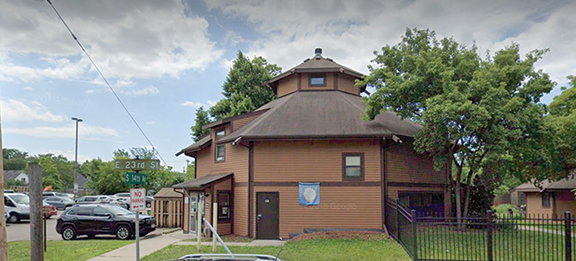By Lee Egerstrom
The Minneapolis City Council has approved a $1 million forgivable loan to the Indigenous Peoples Task Force to help construct a new community center in south Minneapolis, the Mikwanedun Audisookon Art and Wellness Center.
This support comes from the city’s use of federal economic recovery funds. It is the third award, totaling $3.5 million, which Mayor Jacob Frey and the city council have made in support of Clyde Bellecourt Urban Indigenous Legacy Initiative (UILI) nonprofit organizations.
Late last year, the city council approved $1 million to aid MIGIZI Communications, which is building a new facility for its education and training programs at 1845 E. Lake St.; and $1.5 million for the Minneapolis American Indian Center’s (MAIC) 32.5 million expansion and remodeling project.
This is the first major renovation since the 1530 E. Franklin Ave. center was initially constructed 47 years ago.
MIGIZI’s former home was destroyed during the riots that followed the 2020 murder of George Floyd. The city’s announcement said MIGIZI’s construction budget is about $8.2 million and part of an $11 million community development project.
“I am happy to be celebrating another milestone in our investments in the Clyde Bellecourt Urban Indigenous Legacy Initiative,” Mayor Frey said after the council’s approval on April 27. “At its heart, the purpose of the (UILI) is to ensure that our integral Minneapolis cultural institutions are supported and can continue their essential work.”
Sixteen Twin Cities-based Native oriented nonprofits formed the UILI in the past to cooperate rather just compete for various sources of financial support. The name of Clyde Bellecourt was added this past year after the prominent Native civil rights leader died in January 2022.
The legacy group has bills calling for state funds to support similar projects in the Twin Cities metro area. These bills have passed both houses of the Minnesota Legislature and differences were being resolved in a conference committee as April was coming to a close.
Frey said the Indigenous Peoples Task Force (IPTF) is a “prime example” of an important cultural institution at work in the city. This is done, he said, by “providing culturally specific health, housing and educational services to our Native American community.”
The Mikwanedun Audisookon Art and Wellness Center will allow IPTF to consolidate and expand its health, wellness and education programs, the city said in its announcement. The name “Mik-wane-dun Aud-i-soo-kon” is Ojibwe meaning “remember our teachings.”
The new building will house administrative offices, clinic space, a black box theater, meeting rooms and art workshop space, a commercial kitchen and café, and what the city said is a healing space for IPTF to deliver its services.
It will be a 12,000 square-foot, multi-service neighborhood center to be built at 2313 13th Ave. S., which is a city-owned property site.
“This project creates new opportunities for youth and families in the green economy, careers in arts and Native foods, and entrepreneurial training,” the city announcement said. It also noted that IPTF, founded in 1987, provides culturally appropriate HIV education among direct services to the Native community in Minnesota; and it helps restore relationships among Native communities, and with the earth.
Fundraising for capital improvements is always a challenge for service-providing nonprofit organizations. Minneapolis showed that in its IPTF announcement.
Funding for the community center comes from New Market Tax Credits, loans, contributions from Minnesota’s tribal nations, foundations, corporations and individual donors; and public funding from State of Minnesota, Hennepin County and the city.
The tax credit program is the only source of funding that isn’t always visible within communities. It is a program offered by the U.S. Department of Treasury encouraging community development and economic growth in what are generally regarded as underserved communities.
This is a tax credit program to attract private investment in these communities. Investors get tax credit against federal income taxes equal to 39 percent of their original investment claimed over seven years.
New Market Tax Credits are administered in a competitive application system operated by the Community Development Financial Institutions Fund (CDFI), a program at Treasury. One of its areas of assistance is a Native American CDFI Assistance Program although IPTF programs would qualify for tax credit support under several CDFI assistance categories.







